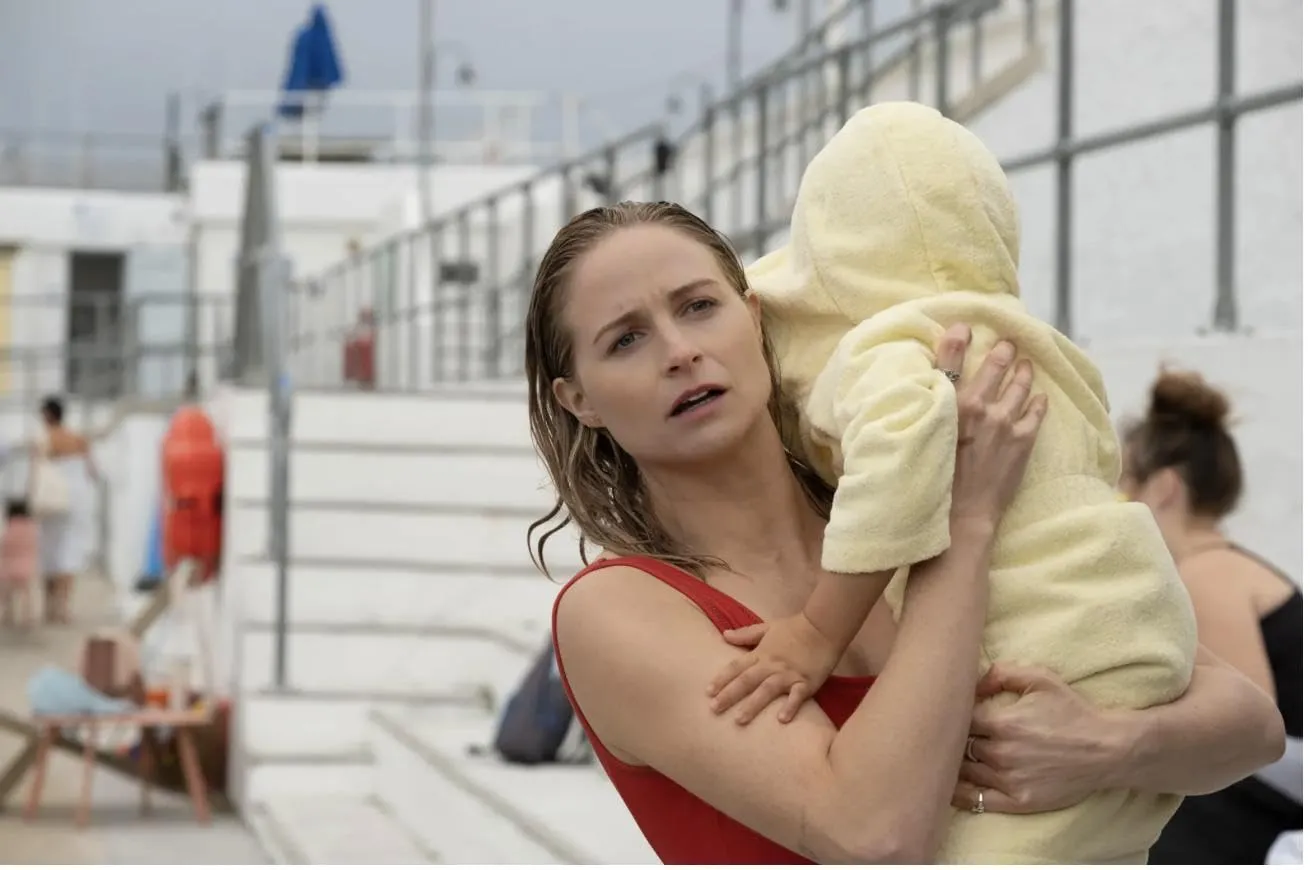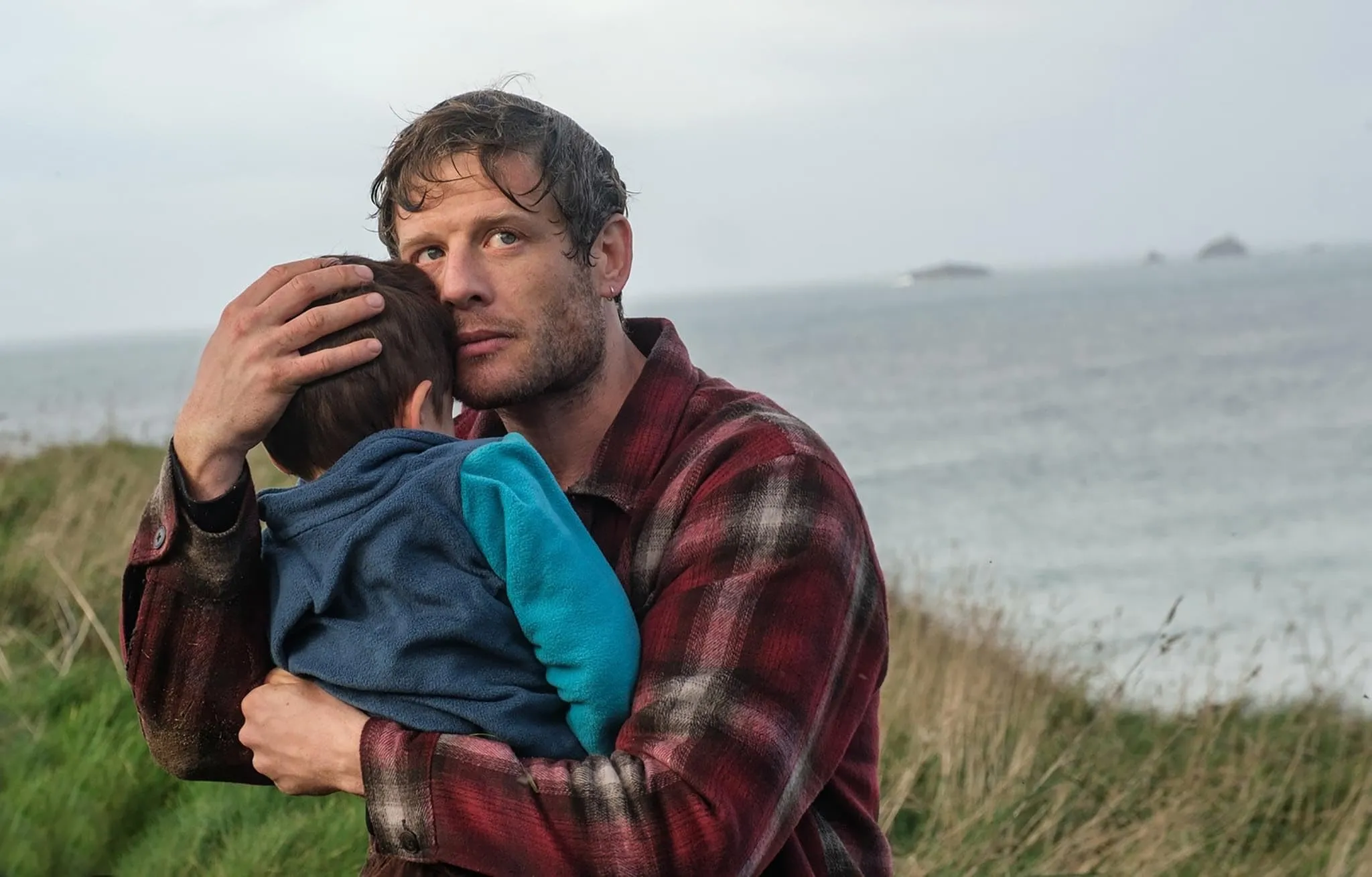At its core, “Playing Nice” deals with a disturbing idea: the scary truth of identities being switched at birth. Despite being sensational, this narrative device reflects viewers’ fears about parenthood and belonging. When Maddie and Pete find out that Theo is not their biological child, they are shocked, and their ideal family is shattered.
This puts them in a maze of moral and emotional problems. With a situation where love is called into question and identity is suddenly malleable, the series skillfully highlights the fragility of familial ties. We see the couple’s confusion as they try to figure out what this new information means, which reflects the larger societal fight with identity in a world that is getting more complicated.
As Miles and Lucy, the other couple caught up in this complicated web of parenthood, are presented to the audience, the plot becomes more complex. Their showing up at the Rileys’ door is more than just a plot twist; it’s a symbol of how people with more wealth and entitlement get into the lives of people who don’t have as much. Miles is the classic controlling bad guy.
He uses manipulative strategies that make people both like and dislike him. His interactions with Pete starkly contrast with parent strategies, successfully demonstrating how different backgrounds affect crisis responses. The custody fight that followed not only makes the tension worse but also serves as a microcosm for societal discussions about ownership and entitlement in parenting. The show asks viewers to reflect on what it means to be a parent in a culture that changes quickly as each character deals with this moral quagmire.
Complex Characters in a Simplified World
Although James Norton’s character, Pete Riley, is portrayed with a blend of sincerity and naivety, he exhibits a troubling inability to deal with the complexities of parenthood and crisis. As he naively befriends Miles, the very antagonist bent on destroying his family, his decisions, which are often based on a desire to keep the peace, frequently veer on stupidity.
This portrayal quietly criticizes the societal expectation that men should just be passive supporters, reflecting a larger conversation about masculinity in contemporary parenting. As they face the terrible truth about their son, Pete, and Maddie’s relationship seems to oscillate between partnership and dependence, showing the stresses of their changing dynamic. Their struggles are a microcosm of the pressures modern parents face, where societal norms force reactions to trauma that often feel inadequate or wrong.
Maddie, played by Niamh Algar, emerges as a much more complex character in comparison. She is a talented cook and the family’s main source of income, but she struggles with both societal expectations and her grief, especially since she is still dealing with the effects of postpartum depression. Her struggles are not just background information but essential to understanding her strong connection to Theo.
Her emotional depth adds depth to the narrative. The portrayal of women as complicated individuals whose personal and work lives are intertwined, challenging traditional gender roles, is a growing trend in television, and Maddie’s character reflects this trend. Her change throughout the series highlights that being a mother is full of joy and sadness, allowing viewers to relate to her situation.
On the other hand, Miles is a cartoon version of the tyrannical bad guy, portrayed by James McArdle with a creepy charm. It’s a bad trend in the media to make bad guys too simple, giving them one-dimensional motives. His character is a good example of this. Miles ‘ lack of character constrains the narrative’s ability to explore the complex nature of parent obsession and entitlement. At the same time, Lucy, played by Jessica Brown Findlay, stays a flat character because her husband’s goals limit her.
Her lack of freedom criticizes how women are usually portrayed in narratives where men are the main characters. This situation begs the question of how often women are portrayed on television, echoing larger societal issues of agency and voice. The conflict between these characters not only moves the plot forward but also shows how parental control and emotional weakness work in different ways, which reflects how story telling in modern TV is changing.
Navigating Parenthood: A Tangle of Identity and Ethics
“Playing Nice” goes deep into the complicated issues of parenting and identity, with the scary case of switched children shining a light on them. The show raises an interesting question: what makes a parent? Does it involve organic ties or the care and love one gives? As Maddie and Pete deal with the shocking news about Theo, their emotional turmoil reflects the worries many modern parents face.
The series skillfully taps into the basic fear of losing a child, making the psychological stakes higher for both partners. A larger societal discussion on gender roles in parenting is highlighted by the contrast between Maddie’s strong maternal feelings and Pete’s passive approach. It shows how identity is not just a function of genetics but is also changed by experience, love, and commitment, challenging viewers to reevaluate the traditional narratives surrounding motherhood and fatherhood.
The custody fight is like a twisty thriller in terms of its moral implications. But they go deeper than that, touching on deeper issues of ownership and entitlement in parenting. The narrative forces the audience to face uncomfortable truths about societal norms surrounding family structures as the Rileys and Lamberts negotiate their tense interactions. The characters’ internal struggles—guilt, fear, and the desire for control—and their interactions with one another are how the switch has psychological effects.
The series suggests that the effects of such a mix-up go beyond the immediate family, resonating within the community and possibly affecting family views of kinship and belonging. This look at moral ambiguity is especially relevant today, where identity and ownership problems are becoming increasingly contentious, whether in family, culture or even digital spaces. As a result, “Playing Nice” develops into more than just a story about two families; it also serves as a commentary on how family ties change in the face of modern societal change.
The Art of Tension: Genre and Aesthetic in “Playing Nice”
Creating a gripping and emotionally charged narrative, “Playing Nice” expertly combines elements of thriller and melodrama. This genre-mixing raises the story’s stakes, luring viewers into a world where the emotional weight of family drama meets the tension of a psychological thriller. The thriller elements keep the audience interested, which are defined by tense situations and Miles’s constant threat.
As the characters’ struggles with identity and loss are similar to universal themes of love and betrayal, the melodramatic elements encourage viewers to connect on a deeper emotional level. This difference in tone changes how viewers see things, allowing them to oscillate between dread and empathy and going against the idea that thrills have to come at the cost of emotional depth. In this way, “Playing Nice” represents a larger trend in modern TV where the boundaries between genres are becoming more ambiguous, indicating a move toward more complex storytelling.
The series has a polished look that draws attention to the big differences between the Rileys’ seemingly perfect lives and the shady sides of their interactions with Miles and Lucy. The cinematography catches the breathtaking beauty of the coastal setting and shows the emotional turmoil below the surface. This decision increases the tension in the narrative. It serves as a commentary on how appearances can be deceiving, a theme becoming increasingly important in a society obsessed with carefully chosen images.
Warm colors evoke a sense of comfort and family life, while cooler colors imply danger and manipulation. Production decisions like lighting and color choices further emphasize this dichotomy. Such decisions highlight the characters’ psychological complexities, allowing the visual storytelling to increase the audience’s comprehension of their inner struggles. “Playing Nice” exemplifies how well-thought-out production can elevate storytelling, creating an immersive experience that resonates with modern cultural anxieties as streaming platforms push the boundaries of visual narrative.
Crafting Tension: The Performances and Direction in “Playing Nice”
The performances in “Playing Nice” show how nuanced acting can make a complicated narrative more interesting. James Norton’s portrayal of Pete Riley captures a blend of vulnerability and naivety, allowing viewers to empathize with a character whose good intentions frequently get him into trouble. It’s easy to feel how well he gets along with Niamh Algar, who plays Maddie.
The way they create a sense of real family love makes their crisis sad. The complexities of a woman dealing with postpartum depression while going through an existential crisis are successfully embodied by Algar’s performance as she moves through Maddie’s emotional landscape, oscillating between strength and fragility.
On the other hand, the portrayal of Miles by James McArdle serves as a sobering reminder of the negative aspects of parenthood. His creepy good looks and bossy behavior make for an unsettling situation that makes viewers reevaluate how they understand moral uncertainty.
As the Rileys face a foe that is both familiar and strange, the chemistry—or lack of it—between these characters heightens the narrative tension and emphasizes the emotional stakes. This is done by appealing to modern concerns about parenting, identity, and trust.
The series’ tension and pace are greatly affected by the direction of “Playing Nice,” which is in the hands of skilled visionaries. Shot composition and strategic framing make important scenes more emotionally powerful, drawing viewers into the character’s inner struggles. The deliberate pacing lets you think during quiet moments, which are different from the faster-paced parts that build tension. The ups and downs of this show how random parenting can be—one moment you’re filled with joy, the next with fear.
Close-ups draw attention to the emotional turmoil on the characters’ faces, allowing the audience to connect with their mental battles. The director also chose to use ambient sound and minimal music during key scenes of conflict, which adds to the unsettling mood and makes viewers lean in closer as if they were feeling what the characters are feeling.
The careful direction in “Playing Nice” exemplifies how thoughtful storytelling can challenge traditional pacing, giving viewers a dynamic experience that resonates with modern cultural fears and familial complexities as streaming platforms redefine narrative structures.
Engaging the Audience: Emotional Depth and Entertainment in “Playing Nice”
“Playing Nice” does a good job of making viewers feel a wide range of feelings and sucked into its narrative web. The series expertly cultivates empathy for its characters through their parent struggles and moral conundrums. As Maddie and Pete deal with the terrible news about their son, viewers are asked to reflect on their fears about parenthood and identity, creating a connection beyond entertainment.
Cliffhangers and plot twists are particularly effective at maintaining tension; each show leaves the audience gasping for air and eager to discover what happens next. For example, as Miles’ nefarious plans become clearer, viewers are kept on edge and oscillate between pulling for the Rileys and worrying about their safety. To keep viewers interested throughout the series, this narrative technique increases tension and emphasizes the emotional stakes.
The series “Playing Nice” is entertaining and has ideas that make you think, making it a good choice for a wide audience. The mix of psychological thriller elements and melodramatic undertones makes for a rich tapestry that appeals to casual viewers and those who want to reflect more deeply on societal norms. Different people have had different responses to it.
Some have praised how it has led to deep conversations about parental rights and identity, while others may think the melodrama sometimes goes too far. Still, the series uses its cliffhanger-driven structure to encourage binge-watching, a key component of effective modern storytelling. In a time when streaming services want exciting shows, “Playing Nice” provides suspense and intrigue and sets itself up as a conversation starter by forcing viewers to face uncomfortable facts about family, identity, and the complexities of contemporary parenthood.
The Review
Playing Nice
"Playing Nice" emerges as an engrossing study of morals, identity, and the complexities of contemporary parenthood. The series captivates viewers through strong performances and thought-provoking themes with its masterful blend of thriller and melodrama. Even though it occasionally borders on melodramatic excess, the emotional depth and societal reflections are powerful and make for deep conversations. Overall, it does a good job of challenging conventional storytelling forms in the age of streaming, making it both engaging and current.
PROS
- Strong performances, particularly from James Norton and Niamh Algar.
- Engaging blend of thriller and melodrama that maintains suspense.
- Thought-provoking themes around identity and parenthood.
- High production quality with captivating visuals.
- Effective cliffhangers that encourage binge-watching.
CONS
- Occasional melodramatic moments that may feel excessive.
- Some character development lacks depth, particularly for supporting roles.
- Pacing issues in certain episodes may disrupt narrative flow.




















































